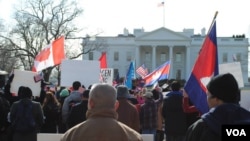Cambodian expatriates in several countries were preparing for three days of protests on Friday and Saturday to demand the release of several human rights workers and opposition supporters.
The protests were planned to happen simultaneously on Friday in Canada and several states in the U.S. that are home to large Cambodian expatriate communities, including California and Massachusetts.
Touch Vibol, president of the Cambodian American Alliance, said he would lead a demonstration to the Capitol to call on the U.S. government to consider imposing sanctions against long-ruling Prime Minister Hun Sen’s government over what he said what a stifling of dissent that had seen numerous opposition members and supporters and even rights workers jailed on spurious charges.
“Our purpose is to push for economic and diplomatic sanctions on the current government,” he said. “This is because human rights situation in Cambodia is worsening. Therefore, to avoid a civil war and plunging the country deeper into crisis [we must] apply a sanction so that the government can come back on the right track.”
“We see that the U.S. was a signatory country to the agreement and has a responsibility to monitor the implementation of democracy and human rights in Cambodia.”
Four Adhoc human rights defenders and an election official are currently in jail on charges of bribing a witness in a sex scandal involving opposition party deputy leader Kem Sokha. At least 10 opposition activists and politicians, including two U.S. citizens, have been sentenced in connection with a violent protest following the 2013 election.
“People are suffering from what is happening in Cambodia nowadays,” said Navan Cheth, a protest organizer in Long Beach, CA. “They cannot accept this injustice so they will come out to support this protest.”
In France and Australia, protests will be held on Saturday.
“We condemn the violation of the constitution by arresting civilians and opposition politicians including lawmakers,” said Ham Bunchhay, a protest organizer in France.
The protesters will also urge the U.S. to lead a campaign to mobilize a so-called “Cambodia Contact Group,” which will consist of the U.S., France, Japan, Indonesia, Australia, and Great Britain.
“The ‘Cambodia Contact Group’ will play a crucial role in ensuring that the election will be conducted free and fair as per the spirit of the 1991 Paris Peace Agreement,” said Vibol. “We see that the U.S. was a signatory country to the agreement and has a responsibility to monitor the implementation of democracy and human rights in Cambodia.”








